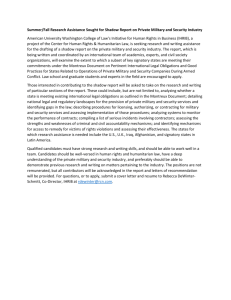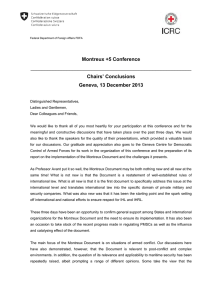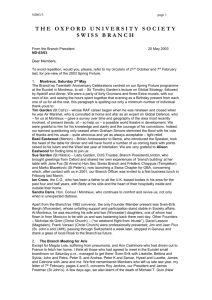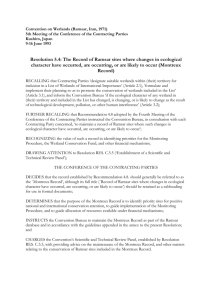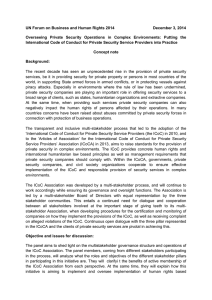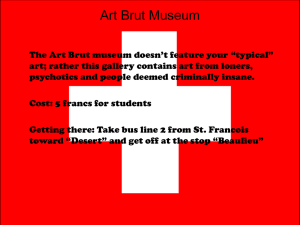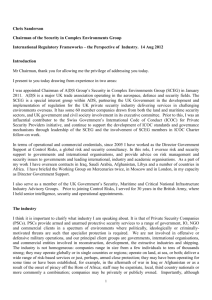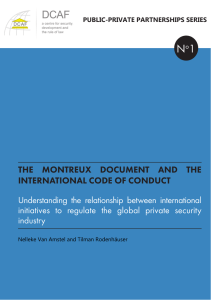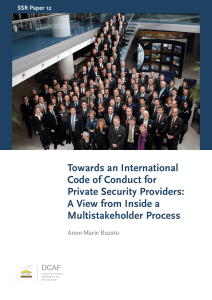KEY ACHIEVEMENTS AN OPPORTUNITY TO ENHANCE ACCOUNTABILITY AND OVERSIGHT
advertisement
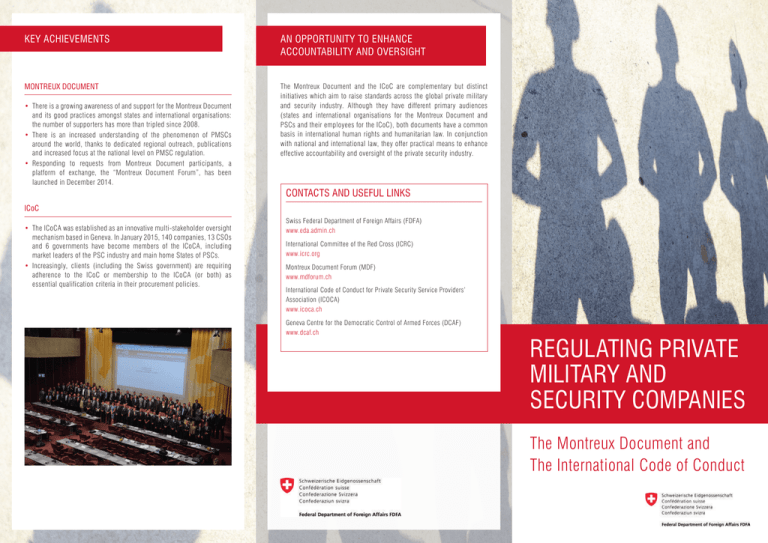
KEY ACHIEVEMENTS AN OPPORTUNITY TO ENHANCE ACCOUNTABILITY AND OVERSIGHT MONTREUX DOCUMENT The Montreux Document and the ICoC are complementary but distinct initiatives which aim to raise standards across the global private military and security industry. Although they have different primary audiences (states and international organisations for the Montreux Document and PSCs and their employees for the ICoC), both documents have a common basis in international human rights and humanitarian law. In conjunction with national and international law, they offer practical means to enhance effective accountability and oversight of the private security industry. • There is a growing awareness of and support for the Montreux Document and its good practices amongst states and international organisations: the number of supporters has more than tripled since 2008. • There is an increased understanding of the phenomenon of PMSCs around the world, thanks to dedicated regional outreach, publications and increased focus at the national level on PMSC regulation. • Responding to requests from Montreux Document participants, a platform of exchange, the “Montreux Document Forum”, has been launched in December 2014. CONTACTS AND USEFUL LINKS ICoC • The ICoCA was established as an innovative multi-stakeholder oversight mechanism based in Geneva. In January 2015, 140 companies, 13 CSOs and 6 governments have become members of the ICoCA, including market leaders of the PSC industry and main home States of PSCs. • Increasingly, clients (including the Swiss government) are requiring adherence to the ICoC or membership to the ICoCA (or both) as essential qualification criteria in their procurement policies. Swiss Federal Department of Foreign Affairs (FDFA) www.eda.admin.ch International Committee of the Red Cross (ICRC) www.icrc.org Montreux Document Forum (MDF) www.mdforum.ch International Code of Conduct for Private Security Service Providers’ Association (ICOCA) www.icoca.ch Geneva Centre for the Democratic Control of Armed Forces (DCAF) www.dcaf.ch REGULATING PRIVATE MILITARY AND SECURITY COMPANIES The Montreux Document and The International Code of Conduct THE GROWTH OF THE PRIVATE MILITARY AND SECURITY INDUSTRY THE MONTREUX DOCUMENT A major challenge Around the world, private actors play a range of different roles in providing military and security services. One important aspect of this phenomenon has been the growth of the commercial private military and security industry. This global industry ranges from major multinational corporations to small-scale local companies. The activities undertaken by these contractors may include activities such as guarding buildings, protecting persons, escorting humanitarian aid convoys, training and advising armed forces, operating complex weapons systems and intelligence-gathering. What is it about? The Montreux Document supports states in their effort to ensure compliance by PMSCs with international human rights and humanitarian law, especially – but not only – when PMSCs are present in armed conflicts. In particular, the good practices contained in the Montreux Document may apply to a wide range of conflict and non-conflict settings. A number of high profile incidents at the beginning of the 21st century highlighted key challenges related to the privatisation of military and security services. These include the potential that companies providing military/security services act in a manner that fails to respect international human rights and humanitarian law, at the same time highlighting gaps in their accountability, particularly where private actors operate in situations of armed conflict or in other contexts of state fragility. Regulatory initiatives In response to these challenges, the Swiss Federal Department of Foreign Affairs (FDFA) launched an international initiative to promote compliance with international human rights and humanitarian law by Private Military and Security Companies (PMSCs) operating in armed conflicts. That initiative has resulted in two major developments: The “Montreux Document” and the “International Code of Conduct” (ICoC). The “Montreux Document”, developed jointly with the International Committee of the Red Cross (ICRC) and adopted in 2008, focuses on pertinent legal obligations and good practices for states related to operations of private military and security companies during armed conflict. The ICoC focuses primarily on the responsibilities of private security companies operating in complex environments, and was developed in 2010 through a multi-stakeholder process involving governments, private security and civil society representatives. The Montreux Document and the ICoC are complementary but distinct initiatives, with distinct memberships. Both are intended to be complementary to and supportive of other international or national regulatory measures. The Montreux Document contains two main par ts: • Part One identifies pertinent obligations under international human rights and humanitarian law for states, in particular for Contracting, Territorial and Home States. The responsibilities of PMSCs and their personnel, and the liability of superiors are also addressed; • Part Two outlines good practices for state regulation of PMSCs. This includes the establishment of transparent regulatory regimes, terms for granting licenses and measures to improve national oversight and accountability. To ensure that only PMSCs capable of complying with international human rights and humanitarian law provide services, good practices in the areas of training, appropriate internal procedures and oversight are proposed. The Montreux Document does not create new obligations for states and is not a new international treaty: the rules assembled in the Montreux Document derive mostly from existing international human rights and humanitarian law. Who is it for? The Montreux Document is principally addressed to states and international organisations. However, the good practices may be of value for other entities such as NGOs and companies that contract PMSCs, as well as for PMSCs themselves. How to join? States and international organisations can join the Montreux Document by sending an official letter or a diplomatic note to the Swiss Federal Department of Foreign Affairs. The Montreux Document was initially adopted by consensus by 17 states. As of April 2015, 52 states and 3 international organisations have expressed support to the Document. The Montreux Document Forum In December 2014, the “Montreux Document Forum” was established as a platform to share good practices and discuss challenges regarding the regulation of PMSCs. It gathers all participants to the Montreux Document and is currently co-chaired by the Swiss FDFA and the ICRC, with the support of the Geneva Centre for the Democratic Control of Armed Forces (DCAF) acting as the Secretariat. THE INTERNATIONAL CODE OF CONDUCT FOR PRIVATE SECURITY SERVICES PROVIDERS What is it about? The International Code of Conduct for Private Security Service Providers (ICoC) is the result of a multi-stakeholder initiative in which private security companies (PSCs), governments and civil society organisations (CSOs) jointly set principles and standards based on international human rights and humanitarian law for the provision of private security services. It also provides for improved accountability of the industry by establishing an external independent governance and oversight mechanism. Who is it for? The ICoC is primarily aimed at the private security industry operating in complex environments. However, it can also be used by PSCs’ clients (states, humanitarian organisations, extractive industries or other commercial actors) to help define expectations and performance standards in connection with their contracting policies and practices. The ICoC contains two main par ts: • Firstly, it sets out principles regarding the conduct of PSC personnel based on international human rights and humanitarian law, including the prohibition of torture, human trafficking, and rules on the use of force; • Secondly, it provides management and oversight principles, such as on vetting of personnel and handling of complaints. The ICoC Association The text of the ICoC calls for the establishment of a governance and oversight mechanism to promote, govern and oversee implementation of the ICoC. To fulfil this role, the ICoCA was established in September 2013 as a Swiss-based non-profit Association based in Geneva. The core functions of the ICoCA are threefold: • Certification of member companies, which involves assessing whether a company’s systems and policies are set up to meet the requirements of the Code; • Monitoring and assessment (through the use of established human rights methodologies) of member companies’ efforts to comply with the Code; • Handling complaints on alleged violations of the Code. How to join? ICoCA membership is open to private security companies, civil society organisations and to all Montreux Document states or intergovernmental organisations. Membership requirements for each pillar are available on the ICoCA’s website (www.icoca.ch), or interested applicants can contact the ICoCA directly (info@icoca.ch). Other interested stakeholders, such as PSCs clients or academics, can obtain the status of “observers” to the ICoCA and thereby contribute to the development of its governance and oversight functions.
